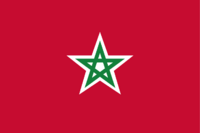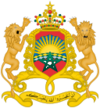Abbara: Difference between revisions
No edit summary |
No edit summary |
||
| Line 136: | Line 136: | ||
==History== | ==History== | ||
===Ubian Civilisation (2000BC-100AD)=== | |||
The first human civilisation in Abbara was the Ubian Civilisation. The first evidence of their presence in the region dates back to around 2000BC, in old coins and pots. They likely arrived from other areas along the modern sea that runs through the north of the nation. | |||
==Foreign Relations== | ==Foreign Relations== | ||
Revision as of 10:37, 13 June 2021
Duradom of Abbara ⴰⴱⴲⴰⵕⴰ | |
|---|---|
| Motto: 'ⵇⵔⴻⵝⴻⵀⵜ ⴻⵓⵔ ⵍⴰⵓⴺ' 'Protect our land' | |
| Capital and City | Surablanca |
| Other languages | Abbaric (ⴰⴱⴱⴰⵕⵉⴿ) |
| Ethnic groups | Abbaric (99%) Other (1%) |
| Religion | Kurranism (88%) Christianity (10%) Judaism (1%) Other (1%) |
| Demonym(s) | Abbaran |
| Government | |
• Dura | Muhamad Al-Aziz VI |
| Legislature | Al-Aziz Family |
| Population | |
• 2021 estimate | 4,750,000 |
• 2018 census | 4,732,908 |
| GDP (PPP) | 2021 estimate |
• Total | $122.458 billion |
| GDP (nominal) | estimate |
• Per capita | $3,441 |
| Gini | 40.7 medium |
| HDI | medium |
| Currency | Dirham |
| Driving side | right |
| Calling code | +287 |
Abbara (Abbaran Arabic: ⴰⴱⴲⴰⵕⴰ) is a sovereign nation in Olivcacia. Lead by the Al-Aziz family, the current Dura is Muhamad Al-Aziz VI, who is the absolute ruler of the nation. Abbara is bordered by Eastarland to the west and sharing a maritime border with Seaview. The nation is made up of 4 million inhabitants, who are a majority Kurranists. The national language of Abbara is Abbaric. The capital and largest city is the cultural city of Surablanca, one of the oldest and most colourful cities in the world.
Abbara are not members of any major international groups, and have few formal foreign relations. They are seen as a low-level global power.
Etymology
History
Ubian Civilisation (2000BC-100AD)
The first human civilisation in Abbara was the Ubian Civilisation. The first evidence of their presence in the region dates back to around 2000BC, in old coins and pots. They likely arrived from other areas along the modern sea that runs through the north of the nation.

